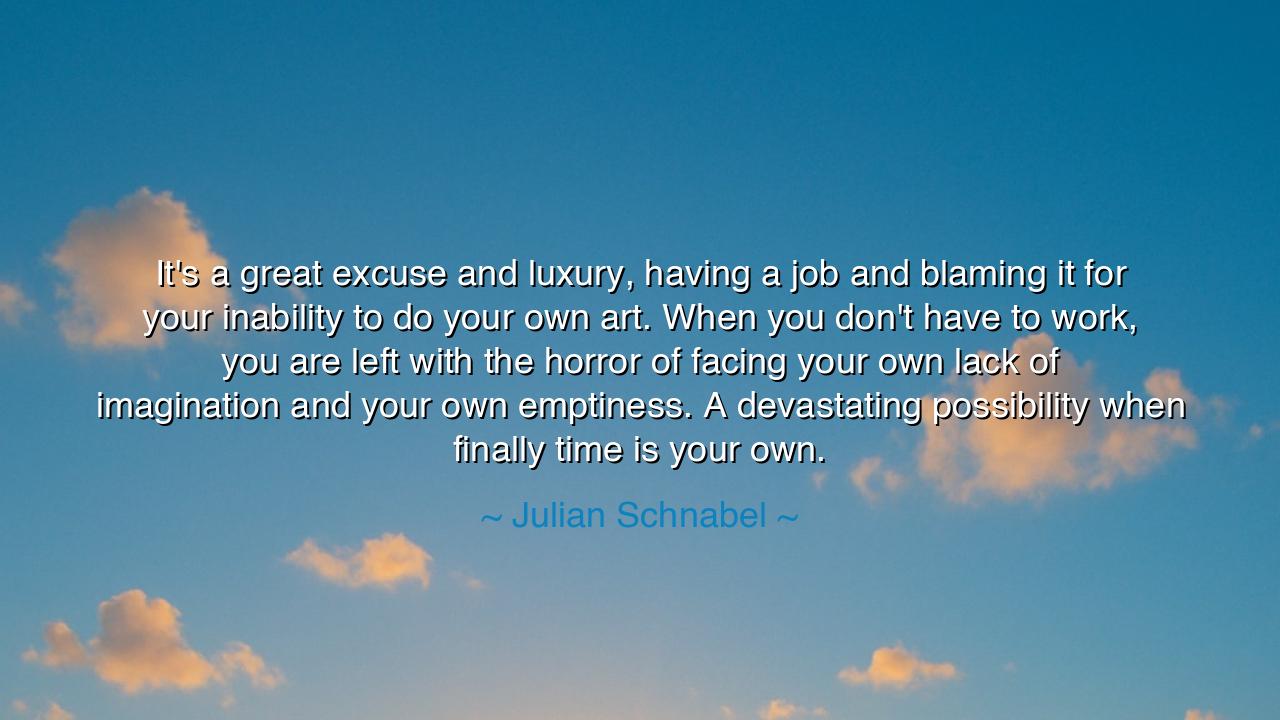
It's a great excuse and luxury, having a job and blaming it for
It's a great excuse and luxury, having a job and blaming it for your inability to do your own art. When you don't have to work, you are left with the horror of facing your own lack of imagination and your own emptiness. A devastating possibility when finally time is your own.






“It’s a great excuse and luxury, having a job and blaming it for your inability to do your own art. When you don’t have to work, you are left with the horror of facing your own lack of imagination and your own emptiness. A devastating possibility when finally time is your own.” Thus spoke Julian Schnabel, the painter and filmmaker whose life has been devoted to the pursuit of creative truth. In this confession, he does not speak only to the artist, but to every soul who has ever hidden behind the armor of busyness — those who say, “I would create, if only I had the time.” His words tear away that veil of comfort and reveal the terrible truth beneath: that often it is not the world that stops us from creating, but ourselves.
Schnabel’s quote arises from the depths of artistic experience. He knows the double-edged sword of freedom — that moment when obligations vanish, when the hours stretch wide and unclaimed, and one must stand naked before one’s own imagination. It is then that many discover not freedom, but fear. The emptiness he speaks of is not the absence of time, but the absence of inner fire. As long as one has a job, a schedule, a chain of excuses, one can hide from that confrontation. But when the chains fall away, and the artist has no one left to blame — not the boss, not the clock, not the system — only then does one learn whether one’s soul truly burns with imagination, or whether it merely smolders in the dark.
The ancients knew this trial well. The philosopher Seneca, who served the emperor Nero, wrote of how many men claim to long for leisure, yet when it comes, they find it unbearable. “They are not free,” he said, “but idle.” For true freedom demands creation, not consumption — purpose, not passivity. Schnabel’s lament mirrors Seneca’s wisdom: that the horror of leisure lies in the mirror it holds up to the soul. When one can no longer say, “I am too busy,” one must instead ask, “What am I afraid to begin?” This is the test of the artist’s courage, and indeed, the courage of every human being.
History gives us countless examples of this confrontation. Consider Vincent van Gogh, who left the security of religious work and the expectations of family to chase his vision of light and color. For years he faced not success, but poverty, rejection, and the gnawing question of whether his imagination was enough to justify his suffering. Many nights, he battled the very emptiness Schnabel describes — yet he chose to face it rather than flee. And though his life was brief, his art endures as a testament to the power of one who dares to create despite the terror of freedom.
In contrast, how many souls through the ages have remained trapped in their excuses! The poet who never wrote because the world was too demanding; the thinker who never spoke because the time was not right; the dreamer who never built because the risk was too great. Each one, like Schnabel’s “worker,” holds tight to the illusion that the fault lies outside themselves. Yet when time is finally theirs — in retirement, in success, in solitude — they meet the same emptiness, that chilling silence where imagination should sing. And they learn, too late, that the greatest prison is not the one built by duty, but the one built by fear.
Thus, Schnabel’s words are not condemnation but invitation. He challenges us to look beyond our excuses, to confront the stillness within, and to ask: “If all distractions were removed, what would I create?” For it is in facing the emptiness that the true imagination awakens. Only by walking through the desert of idleness can one find the oasis of inspiration. The artist’s work — whether painting, writing, building, or living — begins not in comfort, but in confrontation with the void.
The lesson, then, is this: do not wait for time to be given to you. Take it now, even in fragments. Let go of the illusion that busyness is the enemy of art, for the true enemy is fear — fear of discovering that your imagination may not yet be strong enough. Begin anyway. Build something, even small. Create when weary, dream when uninspired, and through that labor, kindle the divine spark that hides beneath the ashes of routine.
And when at last you stand in that rare place where time is wholly your own — do not recoil from the silence. Look into it bravely, as Schnabel did, and say: “Here, in this emptiness, I will create.” For it is only when one faces the terror of freedom that one becomes truly free. The imagination, once confronted, becomes not a burden, but a flame — and through that flame, the soul at last finds its meaning.






AAdministratorAdministrator
Welcome, honored guests. Please leave a comment, we will respond soon